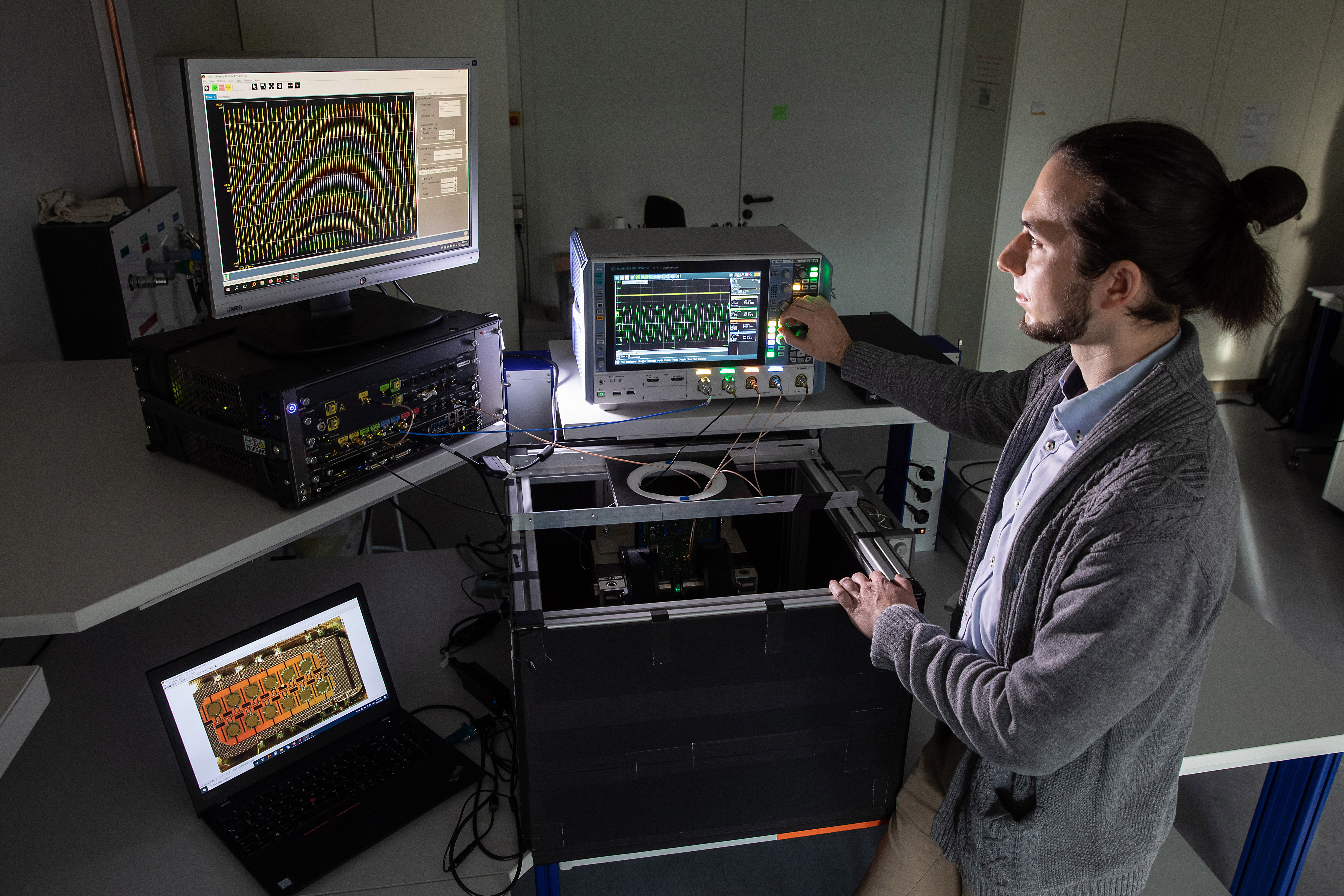The quantum revolution in the healthcare industry
From ultra-fast quantum computers to highly sensitive sensors - quantum technologies could take medicine a giant step forward. Possible areas of application range from drug development and early cancer detection to reading brain waves to control prostheses or exoskeletons. The German state of Baden-Württemberg plays a key role in the development of sensors in particular.
Whenever you hear the term quantum technology, you probably think of abstract formulas and lots of theory rather than the internet or GPS devices. But first-generation quantum systems have been making our everyday lives easier for decades. For example, they form the basis for online data transmission and make GPS systems more accurate. But the most exciting developments are likely to come in the near future.
Quantum technologies are based on the specifics of quantum mechanics, a branch of physics that describes the world at the subatomic level. These technologies use special states such as "superposition" and "entanglement" to process and transmit information. Based on these principles, quantum computers or high-performance sensors make previously unimaginable things possible: computers that solve problems in seconds, which would take conventional computers months. Or sensors that provide insights into previously invisible processes in the human body. There is therefore great hope for quantum technologies, particularly in the healthcare sector. A second quantum revolution is imminent.
Quantum sensors in medicine
"Quantum technologies can provide answers to important questions in medicine, from the ageing society to diseases of civilisation such as cancer," says Prof. Dr. Fedor Jelezko, co-director of the Center for Integrated Quantum Science and Technology (IQST), the association of researchers in the field of quantum technologies in Baden-Württemberg, which was founded in 2014.
Projects in Baden-Württemberg are focusing on quantum sensors – and there’s a good reason for this. Expertise in the field of sensor technology is particularly concentrated in Baden-Württemberg, and quantum sensors are much closer to market maturity than quantum computers. Even now, quantum sensors often outperform conventional ones, and numerous new devices are expected to come onto the market in the next one to five years. "If MR images improve by a few percent, this changes a great deal in terms of early detection and therefore patient treatment," Jelezko explains.
Quantum sensors can be used to find new active ingredients for drugs and biomarkers for diseases
 Measurement setup with quantum sensors in a University of Stuttgart laboratory. © University of Stuttgart
Measurement setup with quantum sensors in a University of Stuttgart laboratory. © University of StuttgartThanks to quantum effects, quantum sensors can measure magnetic fields, acceleration, rotation, gravity and time much more accurately than traditional sensors.1) Current research focuses in particular on screening for the smallest particles and reading magnetic fields in the human body.
"The screening of biomolecules will be one of the first major applications," says Prof. Dr. Jens Anders, spokesperson for the Quantum Sensors of the Future (QSens) cluster funded by the German Federal Ministry of Education and Research (BMBF). In QSens, researchers from the Universities of Stuttgart and Ulm are working closely with industrial partners such as Boehringer Ingelheim to explore the use of quantum sensors in drug development, among other things.
But this is just the tip of the iceberg. The sensitive sensors can also detect tumour markers in the blood at an early stage, for example. Researchers involved in the Ultrasens-Vir project at the University of Ulm are also working on using this technology to detect viruses more quickly and accurately.
From tube-free MRI to mind-controlled prostheses
The ability to measure magnetic fields more precisely using quantum sensors plays a key role in medicine. Magnetic fields are already being used, for example, in magnetic resonance imaging (MRI) scanners to provide insights into the human body. Not only can these images be improved using highly sensitive quantum sensors, but in the long term an MRI scan without a tube might be possible. In future, entire metabolic processes will also be visible in real time in an MRI scanner. The Ulm-based company NVision Imaging Technologies hopes to bring to market a so-called hyperpolariser that can do just that in preclinical studies as early as next year.
Since the signalling pathways in the body generate magnetic fields, the sensors could also be used by surgeons to track the course of nerve pathways or muscles during operations, for example. "And then there's the Holy Grail," says Anders. "Namely, measuring the magnetic fields of the brain." With a human-machine interface, it might even become possible to control medical devices by thought, eliminating the need for high-risk brain surgery. Research is already underway on this, too: mind-controlled prostheses from the orthopaedic technology company Ottobock are planned as part of QSens, as are mind-controlled exoskeletons from the BMBF's NeuroQ project.
Quantum computing in medicine
 Quantum computers, like the one pictured here, could massively speed up the analysis of medical data. © DP/Adobe Stock
Quantum computers, like the one pictured here, could massively speed up the analysis of medical data. © DP/Adobe StockFor some years now, quantum computers have been much more in the limelight than quantum sensors. No wonder that technology giants such as Google, Microsoft and IBM are investing billions in this technology of the future. The new machines are designed to be faster, better and more powerful than today’s supercomputers thanks to quantum effects.
Unlike conventional computers, quantum computers work with qubits rather than bits. Bits are pieces of information represented as either 0 or 1. Qubits exist on a superposition of 0 and 1 and can assume several states simultaneously. Among other things, this allows quantum computers to perform parallel operations and, for certain problems, to reach enormous speeds that dwarf today’s supercomputers. With each additional qubit, the computing power increases exponentially.
Here, too, the application potential is enormous, with the potential to analyse medical data in a fraction of the time it currently takes. Drug research is an obvious initial area of application. Quantum computers have the potential to dramatically accelerate screening for new active substances. What's more: "In future, we will be able to use quantum computers to reliably simulate active pharmaceutical ingredients," says Anders. An enormous advantage for drug development.
Diagnoses could also become faster and more reliable with quantum computers, especially in combination with artificial intelligence (AI). For example, PD Dr. Jeanette Miriam Lorenz’ research group from the Fraunhofer Institute for Cognitive Systems IKS is investigating how quantum computers and AI can improve medical image data such as MRI or CT scans. A similar approach can also be used for tissue analyses, for example, making the technology highly relevant for institutions such as the German Cancer Research Center (DKFZ) in Heidelberg, with which Lorenz is already in contact.
However, many questions regarding work with quantum computers remain unanswered, such as how algorithms need to be designed in order to fully exploit the potential of the new supercomputers. "Quantum computers are not always faster and better than conventional computers," Lorenz points out. "For example, if you try to do arithmetic with a quantum computer, you'll find it incredibly slow. A quantum computer just thinks differently."
Widespread use of quantum computers is still a decade away
While some medical applications of quantum computers could become a reality in the next few years, widespread use in clinical practice is probably still at least a decade away. This is partly because the devices are extremely susceptible to interference and partly because the number of qubits is not yet sufficient. By way of comparison: Google has announced its intention to build a quantum computer with one million qubits by the end of 2029 (of which about 10,000 would then actually be available for calculations after correcting for interference).2) Europe's only commercially usable quantum computer at present, the IBM computer in Ehningen, has an output of 27 qubits.3)
Nevertheless, researchers and companies should get involved with quantum computing as early as possible - preferably immediately, says Lorenz: "The technology is so complex that you have to learn how to deal with it." The opportunity to test quantum computing under real conditions is offered, among other things, by the Quantum Computing Baden-Württemberg competence centre operated by Fraunhofer IAF and IAO, which houses the IBM quantum computer and makes it available to companies, start-ups and academic researchers.
QuantumBW and Quantum Effects: new platforms for exchanging ideas
Baden-Württemberg wants to be ready for the global race to become a pioneer in quantum technology. Together with leading scientific institutions and business giants such as Bosch, Zeiss and Trumpf, the Baden-Württemberg governmenttherefore launched the QuantumBW innovation initiative for quantum technologies in April 2023, which the state government will fund with a total of 31.1 million euros until 2027. "The idea behind QuantumBW is to develop quantum technologies systematically and in a concentrated manner and to make them ready for the market," says Prof. Dr. Joachim Ankerhold, joint spokesperson for the initiative along with former Bosch CEO Dr. Volkmar Denner.
The initial focus will be on quantum sensors. "In the past, Baden-Württemberg developed unique selling points in this area. This sets us apart from others," explains Ankerhold. The funds will also be invested in an infrastructure that provides researchers and industrial partners with the necessary technological access. In this way, facilities such as the state-of-the-art Centre for Applied Quantum Technologies (ZAQuant) at the University of Stuttgart and the Centre for Quantum and Biosciences (ZQB) at the University of Ulm could be made more accessible.
In parallel, the new Quantum Effects trade fair for quantum technologies, which will take place in Stuttgart on 10 and 11 October 2023, offers an additional platform for networking and exchange. Dialogue is crucial not only for companies that want to keep their finger on the pulse, but also for research. "Technology is a solution in search of a problem," says Ankerhold. By no means have all the possible applications of quantum technologies been explored.
People to contact:
IQST:
Prof. Dr. Fedor Jelezko
University of Ulm
E-mail: fedor.jelezko(at)uni-ulm.de
QSens:
Prof. Dr. Jens Anders
University of Stuttgart
E-mail: jens.anders(at)iis.uni-stuttgart.de
QuantumBW:
Prof. Dr. Joachim Ankerhold
University of Ulm
E-mail: joachim.ankerhold(at)uni-ulm.de
Dr. Sonja Lebus-Henn
University of Ulm
E-mail: sonja.lebus-henn(at)uni-ulm.de
Quantum computing-based AI in medicine:
PD Dr. Jeanette Miriam Lorenz
Fraunhofer IKS
E-mail: jeanette.miriam.lorenz(at)iks.fraunhofer.de
-
-
-
-
-
-
Prof. Dr. Fedor Jelezko, Co-Director IQST © University of Ulm
Prof. Dr. Jens Anders, Speaker QSens © University of Stuttgart
PD Dr. habil. Jeanette Miriam Lorenz, Fraunhofer IKS Quantum Computing © Fraunhofer IKS
Prof. Dr. Joachim Ankerhold, Speaker QuantumBW © Joachim Ankerhold (private)